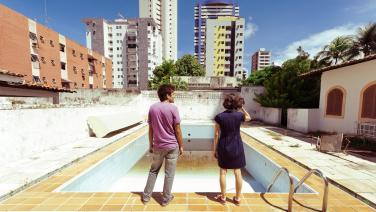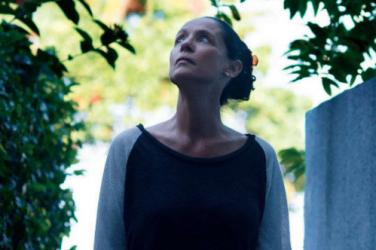This Focus is dedicated to the Brazilian director, producer and film critic, Kleber de Mendonça Vasconcellos Filho (Recife, 1968).


This Focus that we are presenting is dedicated to the Brazilian director, producer and film critic, Kleber de Mendonça Vasconcellos Filho (Recife, 1968).
Filmmaking in Latin America has been a reflection of the prevailing political instability historically. The fragility of social policies usually causes a reaction by the cultural productions, either in the elaboration of their content or in their form of production.
Brazil is not an exception, after a coup d'etat and a extreme-right wing government, in a very short period of time, a year, most of the cultural and social policies that were under construction for the last 14 years were paralyzed. These fluctuations are identified very clearly and critically in the latest national filmic productions, which ended up articulating a cinematographic movement with shared ethical and aesthetic concerns. In this context, the filmmaker Kleber Mendonça Filho has became one of the cornerstones of a resistance cinema that is in full swing.
In 2020 Brazil is still celebrating the most successful film screening on international circuits, where its national production has obtained recognition from both critics and the industry. This creates an apparent paradox of great magnitude, since 2019 was the year when the greatest economic cuts have been made in culture by its current government. However, this zenith would not have occurred without years of active work in cultural policies of decentralization and financing, in an attempt to achieve equal opportunities and distinguishable cinematographic diversity. In this sense, the apparent paradox becomes a coincidence of times in which the great artistic value of current Brazilian cinema coexists within a society led by a government that increasingly restricts freedom of expression.
The latest feature film by Kleber Mendonça and Juliano Dornelles, Bacurau (2019), is one of the works that is included in this catalog of quality productions, establishing itself in it when it was awarded with the Grand Jury Prize in Cannes, a prize never before received by a Brazilian filmmaker. The repercussion of its participation in the cannoise festival caused that the attention on the current political situation in Brazil shot up worldwide. The cultural paradox in which the country finds itself becomes more evident after the film's premiere in commercial cinemas in Brazil, where it has reached the mark of more than 700,000 viewers, making it the fifth most viewed national film of the year.
Mendonça Filho’s previous film, Aquarius (2016) (translated as Doña Clara, and the only title in Kleber's filmography released in Spain), was also premiered in the official Cannes selection and moves through the same spectrum of narratives as they question the prevailing power. At the time of its premiere in Brazil, the demonstrations were massive. This happened a few months after the film's own team denounced the coup d'état in Brazil in the red carpet in Cannes, that action caused strong rejections by the conservative wing of journalists, politicians and citizens. As soon as Aquarius was released in commercial theaters, the viewer's decision to go see it became a political act denouncing the national political situation.
Kleber Mendonça Filho's political commitment is very clear, so there is no way of confusing his cinema with simple propaganda proposals. However, the filmmaker from Recife (location where he has filmed his complete filmography so far) goes much further, proposing in his works a constant dialectical exercise between criticism and self-criticism. This is notorious when we think of the juxtaposition between his films. In O Som ao Redor (2012), the tension between the different social classes is explicit and works as a trigger throughout the narrative. But in his next film, Aquarius (2016), Mendonça Filho looks at his own social class and dissects the contradictions and power games that are presented, carrying out a profound (self) criticism of the bourgeoisie, of which he is also a participant.
The depth and magnitude of the themes addressed in Kleber Mendonça Filho's work is also a reflection of his multidisciplinary career within the cinematographic field. His role as critic, a role he played for almost 15 years - an experience that was extremely useful for his film Critico (2008) - gave him a sharp vision of the complex Brazilian society, still contaminated by the archaic practices of colonelism and the tension between working classes and privileged.
Kleber Mendonça Filho, who was born during the mourning over the death of the “cinema novo” back in 1968, fed on the impulses that made up the movement, which is why, in addition to being a critic and filmmaker, he wanted to be a broadcaster of a very local and international cinema. This is why he created the Janela Internacional festival of Cinema do Recife. His career, made up of a look that inhabits the cinema itself from different cracks, is also marked by his work as a programmer and curator, a role that he has been playing for more than 20 years in prestigious movie theaters in Recife, Sao Paulo and Rio de Janeiro.
With an effervescent cinema in full production, this is the first time that the Spanish public will have the opportunity of an intimate approach to Kleber Mendonça Filho's work. Even when it comes to a filmography that is not very abundant, the importance of promoting and spreading his films becomes evident when considering the formal richness and narrative depth of his works, as well as the exponential potential to make visible the current political situation in Brazil. It seems urgent to us that local political works be disseminated and discussed more and more, in an attempt to strengthen the Brazilian culture, which is constantly threatened.
Seeking to explore the versatility of the Recife director films, this retrospective is made up of all his feature films and a selection of short films (which flow seamlessly from documentary to genre film). In addition, due to its extreme critical sensitivity, we considered crucial to offer him a carte blanche, with the intention of approaching broadly his versatility and deep cinematic vision. The cycle will end with a conversation between Kleber Mendonça Filho and the co-director of Bacurau, Juliano Dornelles.
2020 FIRST TRIMESTER PROGRAMME
9 January, Thursday, 19:00 Cinema 1
O som ao redor, Kleber Mendonça Filho, Brazil, 2012, 131'
19 January, Sunday, 19:00 Cinema 1
Critico, Kleber Mendonça Filho, Brazil 2008, 80'
Luz Industrial Mágica, Kleber Mendonça Filho, Brazil, 2009, 6’
1 February, Saturday, 19:00 Cinema 1
Vinil Verde, 2004
Eletrodoméstica, 2005
Recife Frio, 2009,
A Copa, 2015
14 March, sábado, 19:00 Cinema 1
Aquarius, Kleber Mendonça Filho, Brazil 2016, 140'
20 June, Saturday, 19:00 Cinema 1
Bacurau, Kleber Mendonça Filho & Juliano Dornelles, Brazil, 2019, 132'
15 July, Wednesday, 19:00 Cinema 1
Carte Blanche: Kleber Mendonça Filho
Cabra, marcado para morrer, Eduardo Coutinho, Brazil, 1984, 119'
